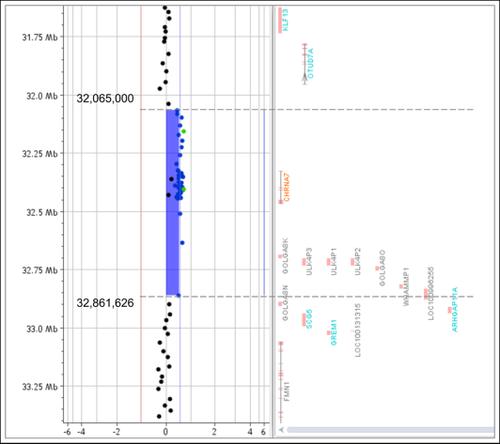当前位置:
X-MOL 学术
›
Genes Brain Behav.
›
论文详情
Our official English website, www.x-mol.net, welcomes your feedback! (Note: you will need to create a separate account there.)
Chromosome 15q13.3 microduplications are associated with treatment refractory major depressive disorder.
Genes, Brain and Behavior ( IF 2.5 ) Pub Date : 2019-12-11 , DOI: 10.1111/gbb.12628 Lora McClain 1 , Anna M Segreti 1 , Sharon Nau 1 , Patricia Shaw 2 , David N Finegold 3 , Lisa A Pan 1, 3 , David G Peters 1, 2, 3, 4
Genes, Brain and Behavior ( IF 2.5 ) Pub Date : 2019-12-11 , DOI: 10.1111/gbb.12628 Lora McClain 1 , Anna M Segreti 1 , Sharon Nau 1 , Patricia Shaw 2 , David N Finegold 3 , Lisa A Pan 1, 3 , David G Peters 1, 2, 3, 4
Affiliation

|
Major depressive disorder (MDD) affects approximately 15 million Americans. Approximately 2 million of these are classified as being refractory to treatment (TR‐MDD). Because of the lack of available therapies for TR‐MDD, and the high risk of suicide, there is interest in identifying new treatment modalities and diagnostic methods. Understanding of the impact of genomic copy number variation in the etiology of a variety of neuropsychiatric phenotypes is increasing. Low copy repeat elements at 15q13.3 facilitate non‐allelic homologous recombination, resulting in recurrent copy number variants (CNVs). Numerous reports have described association between microdeletions in this region and a variety of neuropsychiatric phenotypes, with CHRNA7 implicated as a candidate gene. However, the pathogenicity of 15q13.3 duplications is less clear. As part of an ongoing study, in which we have identified a number of metabolomic anomalies in spinal fluid from TR‐MDD patients, we also evaluated genomic copy number variation in patients (n = 125) and controls (n = 26) via array‐based copy number genomic hybridization (CGH); the case frequency was compared with frequencies reported in a prior study as well as a larger population‐sized cohort. We identified five TR‐MDD patients with microduplications involving CHRNA7 . CHRNA7 duplications are the most common CNVs identified by clinical CGH in this cohort. Therefore, this study provides insight into the potential involvement of CHRNA7 duplications in the etiology of TR‐MDD and informs those involved with care of affected individuals.
中文翻译:

染色体15q13.3微复制与难治性重度抑郁症的治疗有关。
重度抑郁症(MDD)影响约1500万美国人。其中约有200万被归类为难治性(TR‐MDD)。由于缺乏可用于TR‐MDD的疗法,并且自杀风险很高,因此有兴趣确定新的治疗方式和诊断方法。人们越来越了解基因组拷贝数变异对各种神经精神病学表型病因的影响。15q13.3处的低拷贝重复元件可促进非等位基因同源重组,从而导致重复拷贝数变异(CNV)。大量报道描述了该区域的微缺失与多种神经精神病学表型之间的关联,并使用CHRNA7与候选基因有关。但是,15q13.3重复项的致病性尚不清楚。作为一项正在进行的研究的一部分,在其中我们发现了TR‐MDD患者脊髓液中的许多代谢组异常,我们还通过阵列评价了患者(n = 125)和对照(n = 26)的基因组拷贝数变异。基于拷贝数的基因组杂交(CGH);将病例频率与先前研究报告的频率以及较大人群规模的队列进行比较。我们确定了5名TR-MDD患者,这些患者中有涉及CHRNA7的微复制。CHRNA7重复是该人群中临床CGH鉴定出的最常见的CNV。因此,本研究为CHRNA7的潜在参与提供了见识。 重复TR‐MDD的病因,并告知参与治疗的患者。
更新日期:2019-12-11
中文翻译:

染色体15q13.3微复制与难治性重度抑郁症的治疗有关。
重度抑郁症(MDD)影响约1500万美国人。其中约有200万被归类为难治性(TR‐MDD)。由于缺乏可用于TR‐MDD的疗法,并且自杀风险很高,因此有兴趣确定新的治疗方式和诊断方法。人们越来越了解基因组拷贝数变异对各种神经精神病学表型病因的影响。15q13.3处的低拷贝重复元件可促进非等位基因同源重组,从而导致重复拷贝数变异(CNV)。大量报道描述了该区域的微缺失与多种神经精神病学表型之间的关联,并使用CHRNA7与候选基因有关。但是,15q13.3重复项的致病性尚不清楚。作为一项正在进行的研究的一部分,在其中我们发现了TR‐MDD患者脊髓液中的许多代谢组异常,我们还通过阵列评价了患者(n = 125)和对照(n = 26)的基因组拷贝数变异。基于拷贝数的基因组杂交(CGH);将病例频率与先前研究报告的频率以及较大人群规模的队列进行比较。我们确定了5名TR-MDD患者,这些患者中有涉及CHRNA7的微复制。CHRNA7重复是该人群中临床CGH鉴定出的最常见的CNV。因此,本研究为CHRNA7的潜在参与提供了见识。 重复TR‐MDD的病因,并告知参与治疗的患者。


























 京公网安备 11010802027423号
京公网安备 11010802027423号